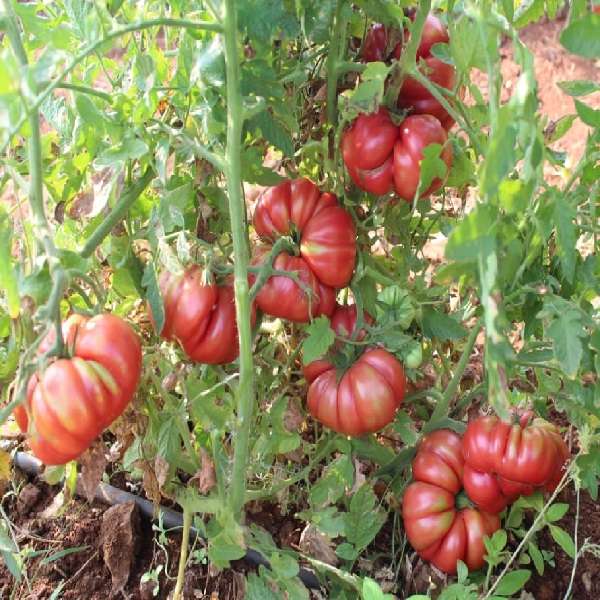Kashi Tomato (Beefsteak Type)
Quantity: 40 seeds+
Heirloom Desi Kashi Tomatoes are a cherished variety known for their rich flavor, nutritional benefits, and cultural significance. While they may require more careful cultivation and pest management, their unique qualities make them a valuable addition to any garden or farm. By preserving and promoting heirloom varieties like Desi Kashi, farmers and gardeners contribute to sustainable agriculture and the conservation of genetic diversity.
50 in stock
generations. Unlike hybrid varieties, heirloom tomatoes are open-pollinated and are known for their rich flavor, diverse shapes, and colors. The Desi Kashi Tomato is particularly valued for its unique characteristics and suitability for local growing conditions.
Description
- Appearance: Heirloom Desi Kashi Tomatoes often have a varied appearance, including irregular shapes and sizes. The color can range from deep red to a reddish-orange hue.
- Size: These tomatoes are typically medium to large-sized, with a slightly flattened shape and a ribbed surface.
- Texture and Taste: The flesh of Desi Kashi Tomatoes is firm yet juicy, with an intense and complex flavor that balances sweetness and acidity. This rich taste makes them highly sought after for culinary purposes.
Cultivation
- Climate: Desi Kashi Tomatoes thrive in warm, sunny climates typical of many regions in India. They are well-adapted to local growing conditions, including variations in temperature and rainfall.
- Planting: Seeds are sown in nursery beds and transplanted into the field once the seedlings are robust enough, usually around 25-30 days old. Proper spacing between plants ensures good air circulation and sunlight exposure.
- Growing Season: These tomatoes can be grown in multiple seasons, although they perform best during the summer and early monsoon periods. The growing period is typically around 75-85 days from transplanting to harvest.
- Care: Regular watering, organic fertilization, and mulching help maintain soil moisture and fertility. Heirloom varieties may require more vigilant pest and disease management compared to hybrids.
Advantages
- Flavor: The rich and nuanced flavor of Heirloom Desi Kashi Tomatoes makes them ideal for a variety of culinary uses, including salads, sauces, and traditional Indian dishes.
- Genetic Diversity: As an heirloom variety, Desi Kashi Tomatoes contribute to genetic diversity, which is crucial for sustainable agriculture and resilience to pests and diseases.
- Cultural Heritage: Growing heirloom varieties like Desi Kashi helps preserve agricultural traditions and local heritage.
Culinary Uses
- Versatility: These tomatoes are versatile in the kitchen, suitable for fresh consumption, cooking, and preserving. They are particularly favored for making chutneys, curries, and other traditional recipes.
- Nutritional Value: Rich in vitamins A and C, potassium, and antioxidants like lycopene, Heirloom Desi Kashi Tomatoes are nutritious and beneficial for health.
Challenges
- Susceptibility to Diseases: Heirloom tomatoes can be more susceptible to certain diseases compared to hybrid varieties. Effective organic pest and disease management practices are essential.
- Yield Variability: The yield of heirloom varieties can be less predictable and lower compared to hybrids. However, the superior taste and quality often compensate for this.
Economic Impact
- Market Niche: There is a growing market for heirloom tomatoes due to their superior flavor and nutritional benefits. They can fetch a premium price in local and specialty markets.
- Sustainable Farming: Growing heirloom tomatoes supports sustainable farming practices and promotes biodiversity.
Conclusion
Heirloom Desi Kashi Tomatoes are a cherished variety known for their rich flavor, nutritional benefits, and cultural significance. While they may require more careful cultivation and pest management, their unique qualities make them a valuable addition to any garden or farm. By preserving and promoting heirloom varieties like Desi Kashi, farmers and gardeners contribute to sustainable agriculture and the conservation of genetic diversity.
| Weight | 5 g |
|---|







Reviews
There are no reviews yet.